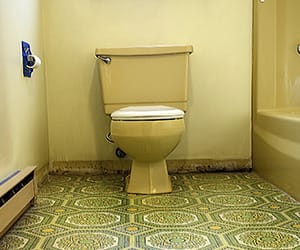Saturday, January 20th, 2024
How old is our toilet? Know the lifespan of your plumbing fixtures.

We all want our home’s plumbing components to last as long as possible, and while maintenance and repair can extend the life of your plumbing, there comes a time when fixtures like toilets, pipes, and water heaters will need to be replaced.
Below, we share the average lifespan of our most used plumbing components, their typical lifespan, and how to know if it’s time for them to be replaced.
Toilets
Considering that the average lifespan of a toilet is 50 years, you might have some time before it needs to be replaced. But here’s the thing: toilets consist of many different components, and when one breaks, it can sometimes cost less to replace the entire toilet than repair it. Should you notice a crack in the toilet itself, you’ll need to invest in a new one.
Another thing to consider is older toilets use more water. If your toilet is 30 years or older, we recommend replacing it to save water, which might help you save on your monthly bill.
Faucets
Most faucets last about 12 years. And sometimes, it costs more to repair a faucet than to replace it – but not always. Common faucet issues that require repair include the buildup of materials from hard water and general wear and tear.
We recommend regularly cleaning your faucets with a solution that kills mineral buildup, replacing cartridges in cartridge-style faucets, and trying DIY faucet repair before buying new ones.
Pipes
Not sure what material your pipes are made from? Check the warranty if your home is new or the home inspection report. This is important information because the longevity of your pipes depends on their material.
Here’s the general lifespan of the most popular pipes:
- PVC piping – 30-50 years
- Brass, steel, or iron – 60-70 years
- Copper – Up to 80 years
Water heaters
Don’t learn the hard way that your water heater is past its prime. Wait too long to replace your vintage model, and you could find yourself mopping up quite a bit of water if it breaks. While your water heater may last longer if only a couple of people use it daily, here’s a general idea of how long it should last based on type.
- Traditional water heater – Up to 15 years
- Tankless water heater – Up to 20 years
- Heat pump water heater – 10-12 years
Sump pumps
You probably don’t see it daily but make no mistake – your sump pump is essential to your plumbing. It’s responsible for collecting and removing water that pools in the basement, and should it not function properly, it could put your basement at risk of flooding.
You should have your sump pump inspected once every year to gauge its condition and see if it’s getting close to the time it needs to be replaced. Most sump pumps last an average of 10 years.
Need to know more about your pipes or wondering about the condition of your plumbing components? Let the team at Allied Reddi-Rooter know. We can inspect your home’s plumbing and let you know if its time for some replacements or repairs. Contact us, we always come highly recommended and have earned an A+ rating from the Better Business Bureau for our expert quality of service.
